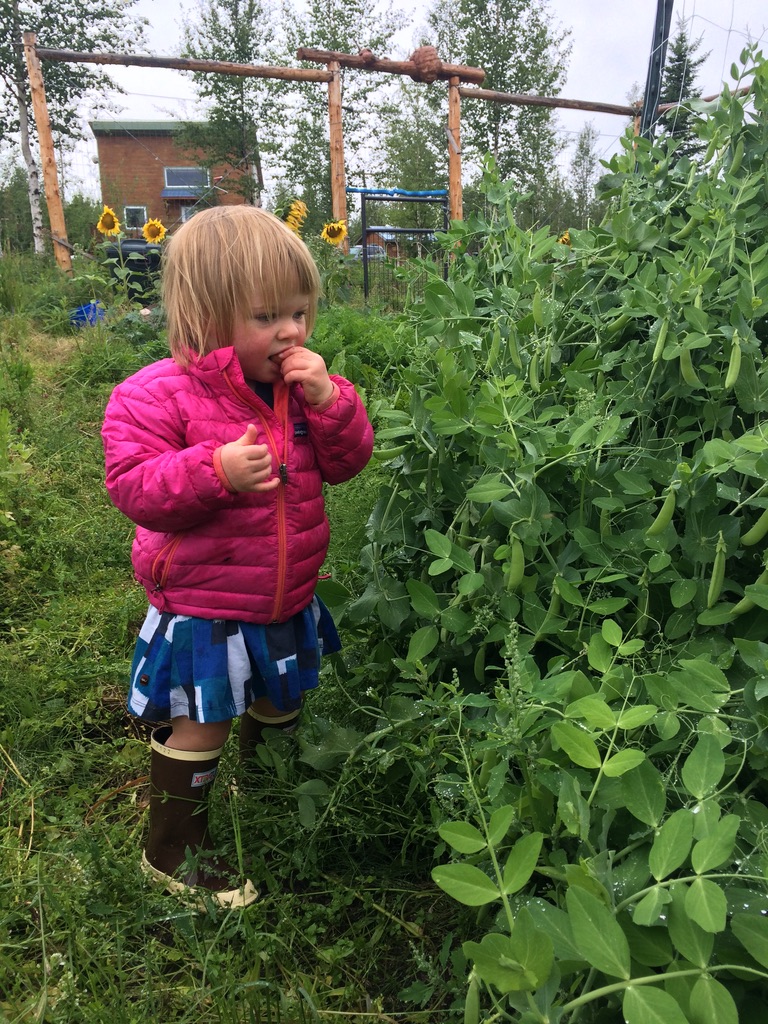This fall, many parents are considering homeschooling, perhaps for the first time, like me. It’s a daunting and somewhat overwhelming task to take on.
While curricula choices abound, some of it is pretty expensive and a little overwhelming. Plus, I don’t want to miss this opportunity to share what I’m passionate about with my kids, as well as explore what piques their curiosity. So how do you turn a passion into a legitimate educational opportunity and add it to your homeschool curriculum?

Kinsey, my daughter, almost 2, in our garden picking peas. Studies have shown that kids eat more vegetables when they partake in growing them.
For me, an obvious passion to share is gardening. While some might think of it as a mere pastime or fun hobby, rather than a source of learning, it’s easy to tie in math, science, literacy, art and history, while developing a useful and perhaps even vital skill, which is growing your own food.
Wild Rose Farm uses its farm in Fairbanks as a vibrant setting for its popular outdoor summer camps. I asked Susan Kerndt, who runs the Wild Rose Camps and teaches at Boreal Sun Charter School, what advice she’d give to first-time homeschool parents wanting to use gardening in their homeschool curriculum.
She said opportunities for learning in the garden are endless. For example, something simple like harvesting cabbage can turn into a math lesson (how many cabbages have we picked so far and how many do we still need to pick for everyone in our CSA?), hand-eye coordination (catching and tossing cabbage), and plant development (when are the cabbage ready to be harvested?). Susan said she’s never had a problem inspiring curiosity in kids when it comes to the garden.
Her class at Boreal Sun is involved from start to finish. Students help with the planting and harvest stage. The garden season is capped off with a feast consisting predominantly of food they grew, harvested and prepared — everything from bread made from grain grown in their field, then ground, a large moose stew with fresh vegetables and moose, to an array of ferments they had made previously.
This type of learning seamlessly pairs practical skills with academic ones. Personally, I know I always engage more when there is a practical application to what I’m learning. I’m much more interested in learning about wild plants in terms of their edibility or medicinal use, than just their names alone.
And it could also lead to a lifelong passion. I had my own small garden plot when I was a kid and always enjoyed adding fresh carrots and peas to my Top Ramen when I was a kid. All of my first few jobs except for one involved working at a greenhouse or farm, and it inspired me to pursue graduate work related to gardening and farming and now my career.
If you’d like to incorporate gardening into your homeschool curriculum but aren’t sure where to start, there are lots of resources available! The trick is to find resources that can be adapted to a relatively short time when we actually have an outdoor garden that is not blanketed by snow.
“The Garden Classroom” by Cathy James is an excellent resource for teachers, parents or anyone involved with children. It’s intended for kids aged 4 to 8 and has all sorts of fun, creative ideas for integrating learning with the garden, whatever subject is the focus (math, science, reading or art).
An oldie but goodie if you can find it online is Kids’ Gardening: A Complete Guide for Teachers, Parents and Youth Leaders by Lynn Ocene. As the title implies, it’s a little better suited for a group garden (like a school garden), but Chapters 5 and 6 have a lot of activities that I think are well-suited to a home garden.
In the Alaska Garden with Heidi Rader YouTube videos on Gardening with kids
Gardening with Kids
Tour of the Georgeson Botanical Garden Children’s Garden
For more links to integrating gardening into your curriculum, check out the following sites:
Alaska Master Gardener Blog (See Gardening with Kids and Lesson Plan Categories)
Alaska Agriculture in the Classroom
4-H Project Ideas
4-H Discover Clubs
Calypso Farm Activity Kits
Life Lab (based in California, offers a few, free units on gardening and learning)
Published in the Fairbanks Daily Newsminer August 16, 2020.